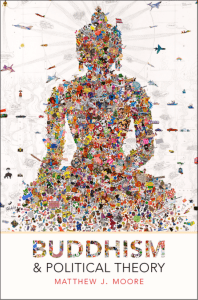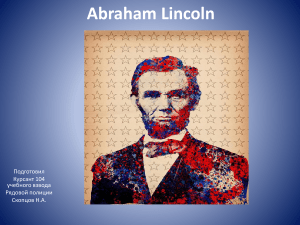План-конспект урока английского языка в 10 классе
реклама
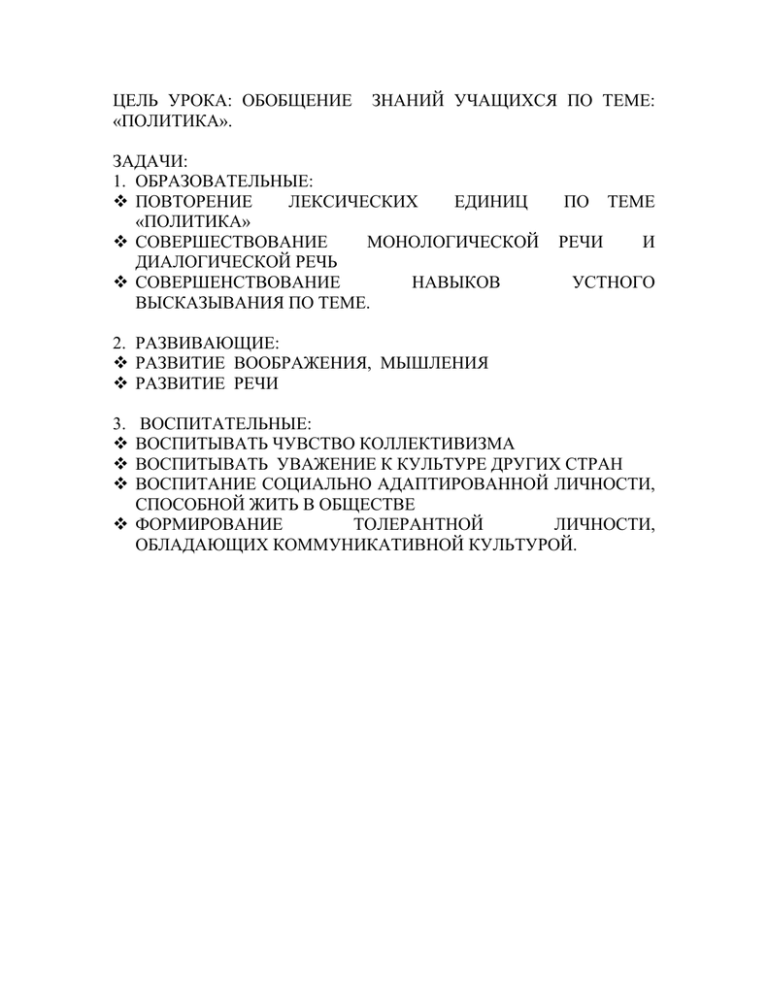
ЦЕЛЬ УРОКА: ОБОБЩЕНИЕ «ПОЛИТИКА». ЗНАНИЙ УЧАЩИХСЯ ПО ТЕМЕ: ЗАДАЧИ: 1. ОБРАЗОВАТЕЛЬНЫЕ: ПОВТОРЕНИЕ ЛЕКСИЧЕСКИХ ЕДИНИЦ «ПОЛИТИКА» СОВЕРШЕСТВОВАНИЕ МОНОЛОГИЧЕСКОЙ ДИАЛОГИЧЕСКОЙ РЕЧЬ СОВЕРШЕНСТВОВАНИЕ НАВЫКОВ ВЫСКАЗЫВАНИЯ ПО ТЕМЕ. ПО РЕЧИ ТЕМЕ И УСТНОГО 2. РАЗВИВАЮЩИЕ: РАЗВИТИЕ ВООБРАЖЕНИЯ, МЫШЛЕНИЯ РАЗВИТИЕ РЕЧИ ВОСПИТАТЕЛЬНЫЕ: ВОСПИТЫВАТЬ ЧУВСТВО КОЛЛЕКТИВИЗМА ВОСПИТЫВАТЬ УВАЖЕНИЕ К КУЛЬТУРЕ ДРУГИХ СТРАН ВОСПИТАНИЕ СОЦИАЛЬНО АДАПТИРОВАННОЙ ЛИЧНОСТИ, СПОСОБНОЙ ЖИТЬ В ОБЩЕСТВЕ ФОРМИРОВАНИЕ ТОЛЕРАНТНОЙ ЛИЧНОСТИ, ОБЛАДАЮЩИХ КОММУНИКАТИВНОЙ КУЛЬТУРОЙ. 3. ДАННЫЙ УРОК ЯВЛЯЕТСЯ ПОВТОРИТЕЛЬНО-ОБОЩАЮЩИМ ПО ТЕМЕ «ПОЛИТИКА» И ВКЛЮЧАЕТ В СЕБЯ ЗАДАНИЯ, НАПРАВЛЕННЫЕ НА ПОВТОРЕНИЕ И ЗАКРЕПЛЕНИЕ ИЗУЧЕННОГО МАТЕРИАЛА. НА ДАННОМ УРОКЕ СЧИТАЮ НЕОБХОДИМЫМ ИСПОЛЬЗОВАНИЕ ИКТ, ТАК КАК ОНИ ПОМОГАЮТ УЧИТЕЛЮ НЕ ТРАТИТЬ ВРЕМЯ НА НАПИСАНИЕ ЗАДАНИЙ НА ДОСКЕ. 1. оргмомент. Приветствие учащихся 2. речевая зарядка 1)agree or disagree with me: the main clock in GB is called Big Ben the flag of GB is called “stars and stripes” the Union Jack is the flag of the USA the Head if GB is the Queen the Head of the USA is the King GB is an absolute monarchy Russia is a federative Republic The Head of the USA is the President There are two Houses in the British Parliament Russian President is elected by people 2) make my sentence longer I think the politician should be patriotic… ……… 3. упражнение на сопоставление Political people and places. This is a simple matching task. Task 1 Political people and places 1. This person is the head of the government. 2. This person is the head of state. 3. These people are elected to represent their areas (known as constituencies). They are also known as MPs. 4. This place is where the Parliament meets. 5. This is the name of the main right-wing party. 6. This is the name of the main left-wing party. Political people and places The Queen / The Conservative Party / The Prime Minister / Members of Parliament / The Houses of Parliament / The Labour Party 4. Do you know them? Do you know the names of these people? (по фотографии учащиеся должны назвать имена людей, изображённых на них) 5. Find Somebody Who… ‘Find Somebody Who…’ activities are generally more challenging for students than they appear at first sight.students work in groups and ask each other. For example: ‘Do you know the name of the British Prime Minister?’ ‘Would you like to be a politician?’ ‘Why / why not?’ Task 2 Find someone who Find somebody who… Find Extra somebody information who… … knows the name of the British Prime Minister. … would like to be a politician. … thinks that voting in elections is very important. … thinks there should be more women politicians in their country. … believes that most politicians are too old! … can name five politicians from their own country. 6. Politics – sentence completion This task leaves students completely free to express their own opinions.. Politics – sentence completion Complete the following sentences to express your own opinion. Then compare your sentences with a partner. 1. In my opinion, most politicians ……. 2. If I were Prime Minister or President of my country I would …… 3. The political system in my country is ……. 4. I wish politicians would ……. 5. In an ideal world ……… 7. Politics and Youth – Reading Students could work in pairs or groups to put the headings in the right place.. Answers: 1 – C, 2 – A, 3 – D , 4 - B Politics and Youth – Reading Read the text about Politics and Youth and put the paragraph headings in the right place. A – Street politics B – Green generation C – Parties and partying D - Hi-tech politics Politics and Youth Last year the BBC announced that more young people voted on Big Brother than the election. Does this make UK youth politically apathetic? 1I spent a couple of days asking young people in the Manchester and London area how they felt about party politics. I spoke to 11 twenty-somethings and only one had voted in the last general election. Here’s some of their comments; ‘To be honest I’m not too bothered. I don’t keep up with developments at Westminster [the site of UK government]. These days my job, my cash flow and socialising are more important!’ Tom, 28, from Manchester. ‘I can’t relate to any of the politicians. They all seem fairly similar and rarely listen to young people. Only one party [the Liberal Democrats] made student debt an issue, and they are a long way from coming to power.’ Fiona, 25, from London. These two examples were typical of many young people’s attitudes to state politics. 2This would suggest that we are just not interested in politics but a closer study is more revealing. For many young people politics is not about Westminster. Issues like the US-UK led Iraq war have sparked debate and action in recent years. In 2003 over a million people marched through London, many of them young and passionate. 3Technology played a huge role in organising this protest on a global scale. It has become a factor in providing many young people across the world with a chance to interact and discuss without the traditional middle-man of the politician or news media. The British Council’s Café Society project allows young people from countries across the world to meet in a relaxed, informal setting and share opinions through video conferencing. 4David Cameron, the leader of the Conservative Party, started cycling to work as gesture of the need to take green issues more seriously. Since then politicians have been keen to win the green label and secure the support of the younger generation. Young people are often perceived to be the ‘greenest’ age group. Indeed environmental issues are taken far more seriously than ever before. Perhaps they’ll leave behind a greener UK. Text written by the British Council’s Trend UK team. 8. Politics and Youth – Let’s discuss the issues This task offers some discussion questions which would follow on nicely from the reading task. Students could discuss them in small groups or you could have a whole class discussion. Politics and Youth – Let’s discuss the issues When you have read the text in task5, discuss the following questions in groups. What are the main problems facing young people in your country today? Do you think politicians understand these problems? Were you surprised that more young people in the UK voted in the reality show Big Brother than in the election? Are young people in your country generally politically apathetic? Would you like to be a politician? Why / why not? 9. Vote for us! This is a fun task that could lead on to becoming a mini project. Put students into groups or ‘parties’. They will have to think of a name for their new political party and to think up five policies that they will use to try and win the election. When all groups have finished, give them each two minutes to try and persuade the other groups to vote for them. Then hold a class election. If you have time to prepare it, make ballot papers and use a shoe box so students can have a secret vote. Then count up the votes and let the winners celebrate! 10. итоги урока.
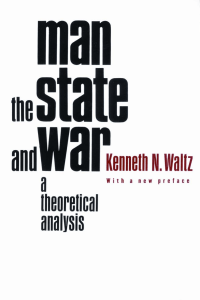
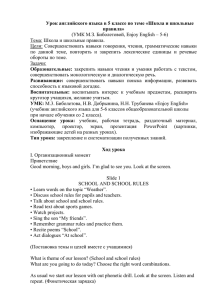
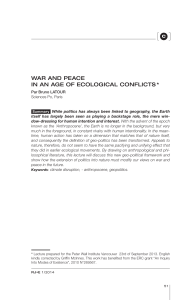
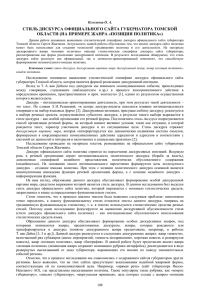
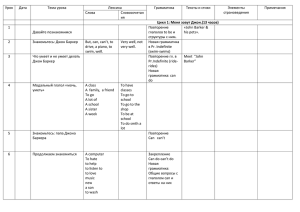
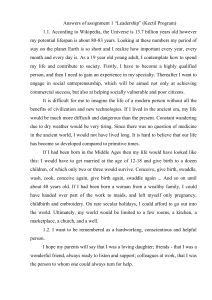
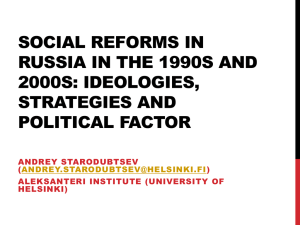
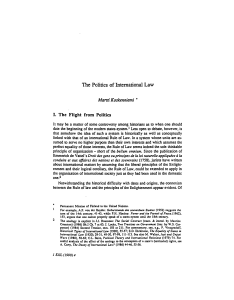
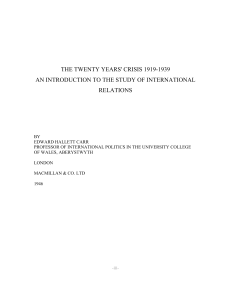
![[TGC] The Modern Political Tradition - Hobbes to Habermas](http://s1.studylib.ru/store/data/006278328_1-045cff4cbe6a2ab0d5a21c81f4ec5606-300x300.png)
